A Comprehensive Analysis of Sustainable Tourism in London, UK
VerifiedAdded on 2023/06/08
|8
|2548
|129
Report
AI Summary
This report provides an in-depth analysis of sustainable tourism practices in London, focusing on the environmental and socio-economic impacts of the tourism industry. It examines the guidelines and policies implemented by the UK government, emphasizing the goal of achieving zero carbon em...
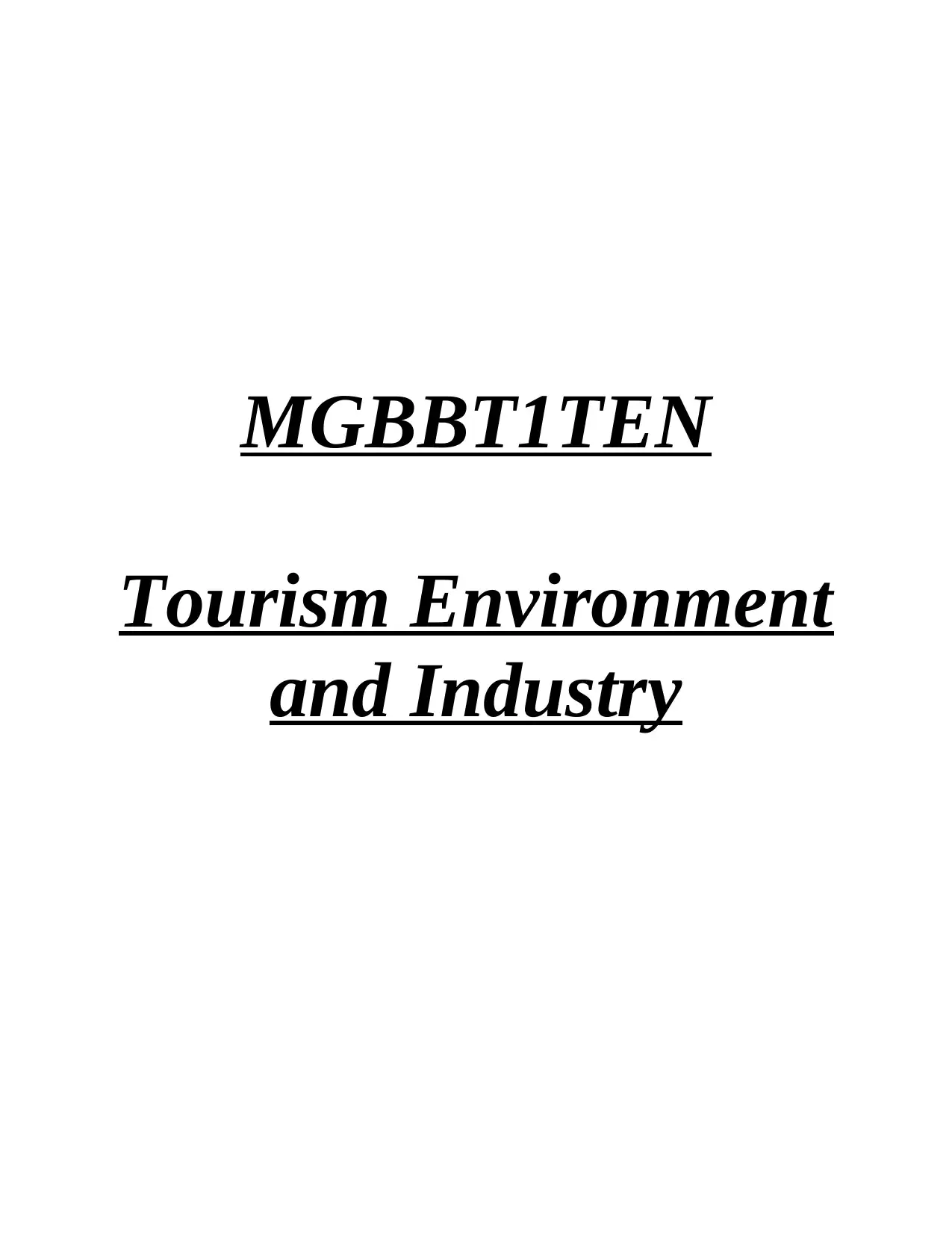
MGBBT1TEN
Tourism Environment
and Industry
Tourism Environment
and Industry
Paraphrase This Document
Need a fresh take? Get an instant paraphrase of this document with our AI Paraphraser

Contents
INTRODUCTION...........................................................................................................................1
MAIN BODY..................................................................................................................................1
CONCLUSION................................................................................................................................5
REFERENCES................................................................................................................................6
INTRODUCTION...........................................................................................................................1
MAIN BODY..................................................................................................................................1
CONCLUSION................................................................................................................................5
REFERENCES................................................................................................................................6
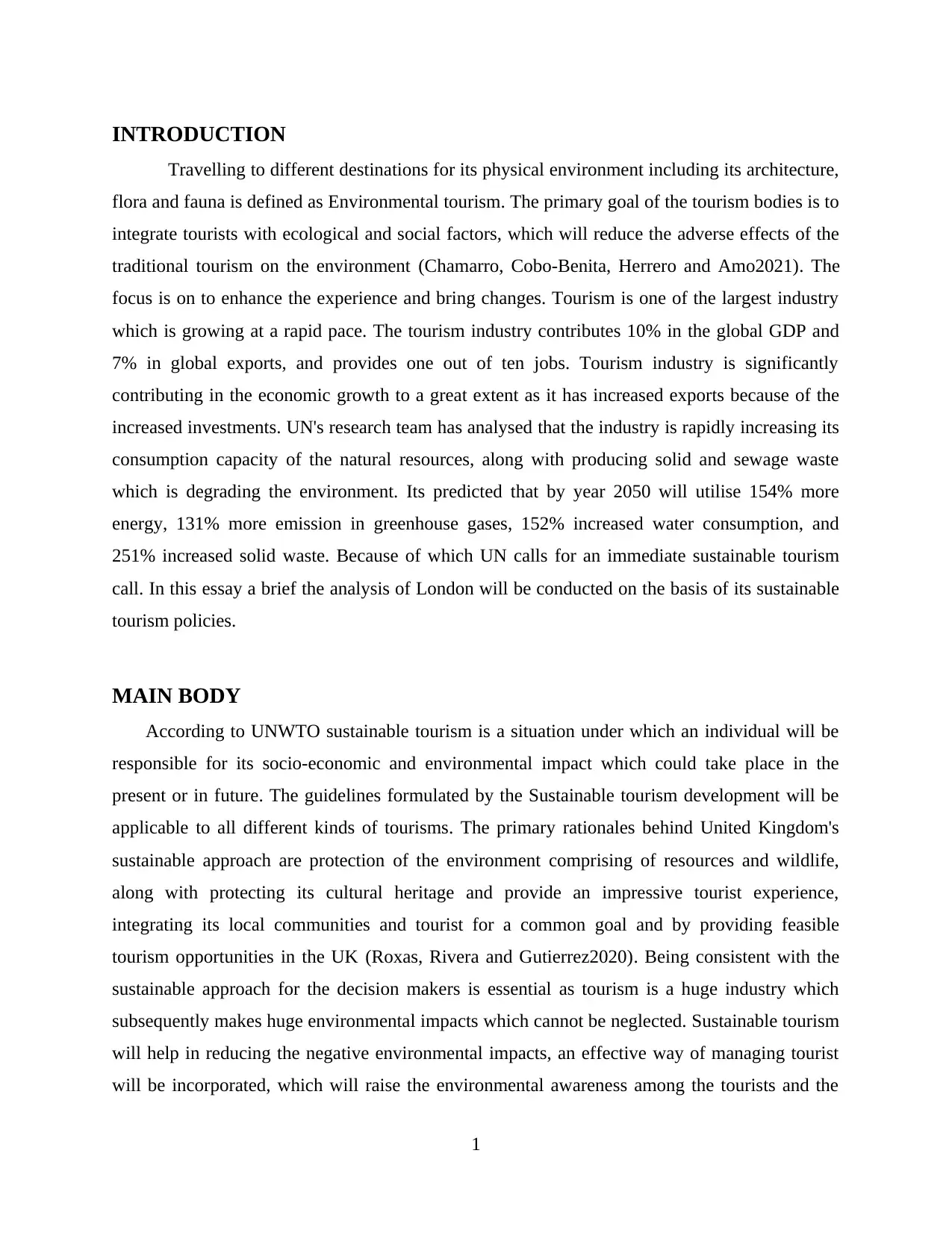
INTRODUCTION
Travelling to different destinations for its physical environment including its architecture,
flora and fauna is defined as Environmental tourism. The primary goal of the tourism bodies is to
integrate tourists with ecological and social factors, which will reduce the adverse effects of the
traditional tourism on the environment (Chamarro, Cobo-Benita, Herrero and Amo2021). The
focus is on to enhance the experience and bring changes. Tourism is one of the largest industry
which is growing at a rapid pace. The tourism industry contributes 10% in the global GDP and
7% in global exports, and provides one out of ten jobs. Tourism industry is significantly
contributing in the economic growth to a great extent as it has increased exports because of the
increased investments. UN's research team has analysed that the industry is rapidly increasing its
consumption capacity of the natural resources, along with producing solid and sewage waste
which is degrading the environment. Its predicted that by year 2050 will utilise 154% more
energy, 131% more emission in greenhouse gases, 152% increased water consumption, and
251% increased solid waste. Because of which UN calls for an immediate sustainable tourism
call. In this essay a brief the analysis of London will be conducted on the basis of its sustainable
tourism policies.
MAIN BODY
According to UNWTO sustainable tourism is a situation under which an individual will be
responsible for its socio-economic and environmental impact which could take place in the
present or in future. The guidelines formulated by the Sustainable tourism development will be
applicable to all different kinds of tourisms. The primary rationales behind United Kingdom's
sustainable approach are protection of the environment comprising of resources and wildlife,
along with protecting its cultural heritage and provide an impressive tourist experience,
integrating its local communities and tourist for a common goal and by providing feasible
tourism opportunities in the UK (Roxas, Rivera and Gutierrez2020). Being consistent with the
sustainable approach for the decision makers is essential as tourism is a huge industry which
subsequently makes huge environmental impacts which cannot be neglected. Sustainable tourism
will help in reducing the negative environmental impacts, an effective way of managing tourist
will be incorporated, which will raise the environmental awareness among the tourists and the
1
Travelling to different destinations for its physical environment including its architecture,
flora and fauna is defined as Environmental tourism. The primary goal of the tourism bodies is to
integrate tourists with ecological and social factors, which will reduce the adverse effects of the
traditional tourism on the environment (Chamarro, Cobo-Benita, Herrero and Amo2021). The
focus is on to enhance the experience and bring changes. Tourism is one of the largest industry
which is growing at a rapid pace. The tourism industry contributes 10% in the global GDP and
7% in global exports, and provides one out of ten jobs. Tourism industry is significantly
contributing in the economic growth to a great extent as it has increased exports because of the
increased investments. UN's research team has analysed that the industry is rapidly increasing its
consumption capacity of the natural resources, along with producing solid and sewage waste
which is degrading the environment. Its predicted that by year 2050 will utilise 154% more
energy, 131% more emission in greenhouse gases, 152% increased water consumption, and
251% increased solid waste. Because of which UN calls for an immediate sustainable tourism
call. In this essay a brief the analysis of London will be conducted on the basis of its sustainable
tourism policies.
MAIN BODY
According to UNWTO sustainable tourism is a situation under which an individual will be
responsible for its socio-economic and environmental impact which could take place in the
present or in future. The guidelines formulated by the Sustainable tourism development will be
applicable to all different kinds of tourisms. The primary rationales behind United Kingdom's
sustainable approach are protection of the environment comprising of resources and wildlife,
along with protecting its cultural heritage and provide an impressive tourist experience,
integrating its local communities and tourist for a common goal and by providing feasible
tourism opportunities in the UK (Roxas, Rivera and Gutierrez2020). Being consistent with the
sustainable approach for the decision makers is essential as tourism is a huge industry which
subsequently makes huge environmental impacts which cannot be neglected. Sustainable tourism
will help in reducing the negative environmental impacts, an effective way of managing tourist
will be incorporated, which will raise the environmental awareness among the tourists and the
1
⊘ This is a preview!⊘
Do you want full access?
Subscribe today to unlock all pages.

Trusted by 1+ million students worldwide
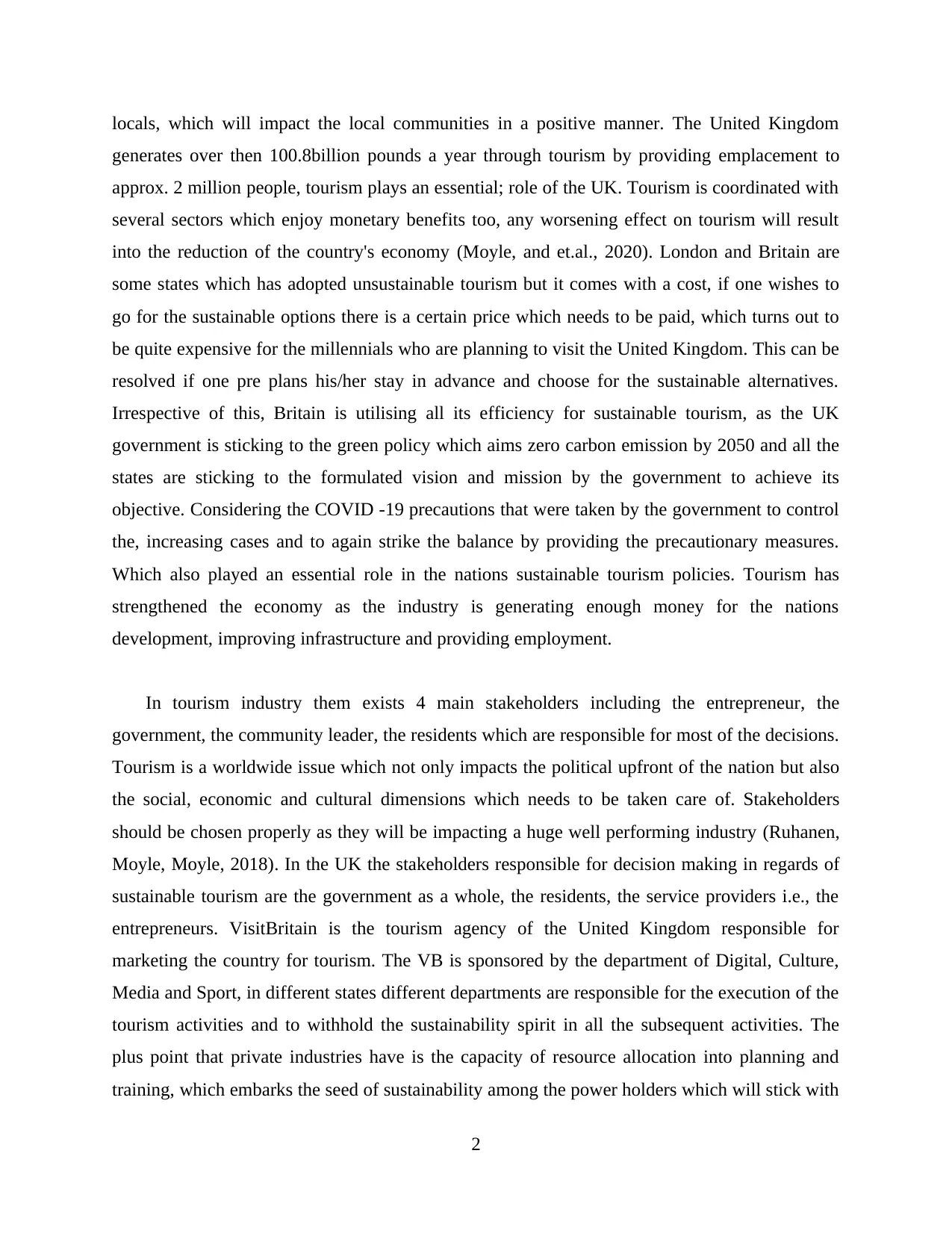
locals, which will impact the local communities in a positive manner. The United Kingdom
generates over then 100.8billion pounds a year through tourism by providing emplacement to
approx. 2 million people, tourism plays an essential; role of the UK. Tourism is coordinated with
several sectors which enjoy monetary benefits too, any worsening effect on tourism will result
into the reduction of the country's economy (Moyle, and et.al., 2020). London and Britain are
some states which has adopted unsustainable tourism but it comes with a cost, if one wishes to
go for the sustainable options there is a certain price which needs to be paid, which turns out to
be quite expensive for the millennials who are planning to visit the United Kingdom. This can be
resolved if one pre plans his/her stay in advance and choose for the sustainable alternatives.
Irrespective of this, Britain is utilising all its efficiency for sustainable tourism, as the UK
government is sticking to the green policy which aims zero carbon emission by 2050 and all the
states are sticking to the formulated vision and mission by the government to achieve its
objective. Considering the COVID -19 precautions that were taken by the government to control
the, increasing cases and to again strike the balance by providing the precautionary measures.
Which also played an essential role in the nations sustainable tourism policies. Tourism has
strengthened the economy as the industry is generating enough money for the nations
development, improving infrastructure and providing employment.
In tourism industry them exists 4 main stakeholders including the entrepreneur, the
government, the community leader, the residents which are responsible for most of the decisions.
Tourism is a worldwide issue which not only impacts the political upfront of the nation but also
the social, economic and cultural dimensions which needs to be taken care of. Stakeholders
should be chosen properly as they will be impacting a huge well performing industry (Ruhanen,
Moyle, Moyle, 2018). In the UK the stakeholders responsible for decision making in regards of
sustainable tourism are the government as a whole, the residents, the service providers i.e., the
entrepreneurs. VisitBritain is the tourism agency of the United Kingdom responsible for
marketing the country for tourism. The VB is sponsored by the department of Digital, Culture,
Media and Sport, in different states different departments are responsible for the execution of the
tourism activities and to withhold the sustainability spirit in all the subsequent activities. The
plus point that private industries have is the capacity of resource allocation into planning and
training, which embarks the seed of sustainability among the power holders which will stick with
2
generates over then 100.8billion pounds a year through tourism by providing emplacement to
approx. 2 million people, tourism plays an essential; role of the UK. Tourism is coordinated with
several sectors which enjoy monetary benefits too, any worsening effect on tourism will result
into the reduction of the country's economy (Moyle, and et.al., 2020). London and Britain are
some states which has adopted unsustainable tourism but it comes with a cost, if one wishes to
go for the sustainable options there is a certain price which needs to be paid, which turns out to
be quite expensive for the millennials who are planning to visit the United Kingdom. This can be
resolved if one pre plans his/her stay in advance and choose for the sustainable alternatives.
Irrespective of this, Britain is utilising all its efficiency for sustainable tourism, as the UK
government is sticking to the green policy which aims zero carbon emission by 2050 and all the
states are sticking to the formulated vision and mission by the government to achieve its
objective. Considering the COVID -19 precautions that were taken by the government to control
the, increasing cases and to again strike the balance by providing the precautionary measures.
Which also played an essential role in the nations sustainable tourism policies. Tourism has
strengthened the economy as the industry is generating enough money for the nations
development, improving infrastructure and providing employment.
In tourism industry them exists 4 main stakeholders including the entrepreneur, the
government, the community leader, the residents which are responsible for most of the decisions.
Tourism is a worldwide issue which not only impacts the political upfront of the nation but also
the social, economic and cultural dimensions which needs to be taken care of. Stakeholders
should be chosen properly as they will be impacting a huge well performing industry (Ruhanen,
Moyle, Moyle, 2018). In the UK the stakeholders responsible for decision making in regards of
sustainable tourism are the government as a whole, the residents, the service providers i.e., the
entrepreneurs. VisitBritain is the tourism agency of the United Kingdom responsible for
marketing the country for tourism. The VB is sponsored by the department of Digital, Culture,
Media and Sport, in different states different departments are responsible for the execution of the
tourism activities and to withhold the sustainability spirit in all the subsequent activities. The
plus point that private industries have is the capacity of resource allocation into planning and
training, which embarks the seed of sustainability among the power holders which will stick with
2
Paraphrase This Document
Need a fresh take? Get an instant paraphrase of this document with our AI Paraphraser
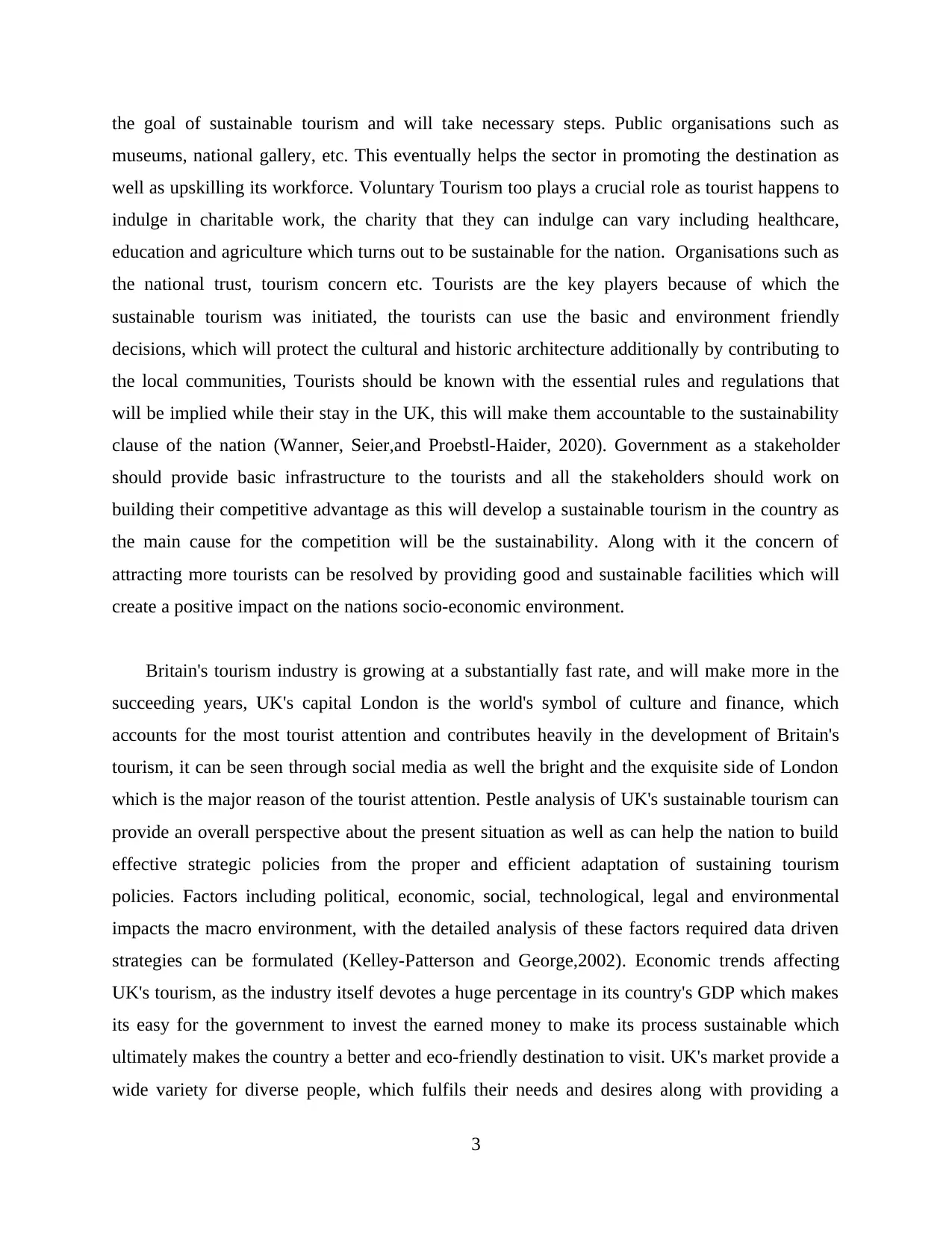
the goal of sustainable tourism and will take necessary steps. Public organisations such as
museums, national gallery, etc. This eventually helps the sector in promoting the destination as
well as upskilling its workforce. Voluntary Tourism too plays a crucial role as tourist happens to
indulge in charitable work, the charity that they can indulge can vary including healthcare,
education and agriculture which turns out to be sustainable for the nation. Organisations such as
the national trust, tourism concern etc. Tourists are the key players because of which the
sustainable tourism was initiated, the tourists can use the basic and environment friendly
decisions, which will protect the cultural and historic architecture additionally by contributing to
the local communities, Tourists should be known with the essential rules and regulations that
will be implied while their stay in the UK, this will make them accountable to the sustainability
clause of the nation (Wanner, Seier,and Proebstl-Haider, 2020). Government as a stakeholder
should provide basic infrastructure to the tourists and all the stakeholders should work on
building their competitive advantage as this will develop a sustainable tourism in the country as
the main cause for the competition will be the sustainability. Along with it the concern of
attracting more tourists can be resolved by providing good and sustainable facilities which will
create a positive impact on the nations socio-economic environment.
Britain's tourism industry is growing at a substantially fast rate, and will make more in the
succeeding years, UK's capital London is the world's symbol of culture and finance, which
accounts for the most tourist attention and contributes heavily in the development of Britain's
tourism, it can be seen through social media as well the bright and the exquisite side of London
which is the major reason of the tourist attention. Pestle analysis of UK's sustainable tourism can
provide an overall perspective about the present situation as well as can help the nation to build
effective strategic policies from the proper and efficient adaptation of sustaining tourism
policies. Factors including political, economic, social, technological, legal and environmental
impacts the macro environment, with the detailed analysis of these factors required data driven
strategies can be formulated (Kelley-Patterson and George,2002). Economic trends affecting
UK's tourism, as the industry itself devotes a huge percentage in its country's GDP which makes
its easy for the government to invest the earned money to make its process sustainable which
ultimately makes the country a better and eco-friendly destination to visit. UK's market provide a
wide variety for diverse people, which fulfils their needs and desires along with providing a
3
museums, national gallery, etc. This eventually helps the sector in promoting the destination as
well as upskilling its workforce. Voluntary Tourism too plays a crucial role as tourist happens to
indulge in charitable work, the charity that they can indulge can vary including healthcare,
education and agriculture which turns out to be sustainable for the nation. Organisations such as
the national trust, tourism concern etc. Tourists are the key players because of which the
sustainable tourism was initiated, the tourists can use the basic and environment friendly
decisions, which will protect the cultural and historic architecture additionally by contributing to
the local communities, Tourists should be known with the essential rules and regulations that
will be implied while their stay in the UK, this will make them accountable to the sustainability
clause of the nation (Wanner, Seier,and Proebstl-Haider, 2020). Government as a stakeholder
should provide basic infrastructure to the tourists and all the stakeholders should work on
building their competitive advantage as this will develop a sustainable tourism in the country as
the main cause for the competition will be the sustainability. Along with it the concern of
attracting more tourists can be resolved by providing good and sustainable facilities which will
create a positive impact on the nations socio-economic environment.
Britain's tourism industry is growing at a substantially fast rate, and will make more in the
succeeding years, UK's capital London is the world's symbol of culture and finance, which
accounts for the most tourist attention and contributes heavily in the development of Britain's
tourism, it can be seen through social media as well the bright and the exquisite side of London
which is the major reason of the tourist attention. Pestle analysis of UK's sustainable tourism can
provide an overall perspective about the present situation as well as can help the nation to build
effective strategic policies from the proper and efficient adaptation of sustaining tourism
policies. Factors including political, economic, social, technological, legal and environmental
impacts the macro environment, with the detailed analysis of these factors required data driven
strategies can be formulated (Kelley-Patterson and George,2002). Economic trends affecting
UK's tourism, as the industry itself devotes a huge percentage in its country's GDP which makes
its easy for the government to invest the earned money to make its process sustainable which
ultimately makes the country a better and eco-friendly destination to visit. UK's market provide a
wide variety for diverse people, which fulfils their needs and desires along with providing a
3
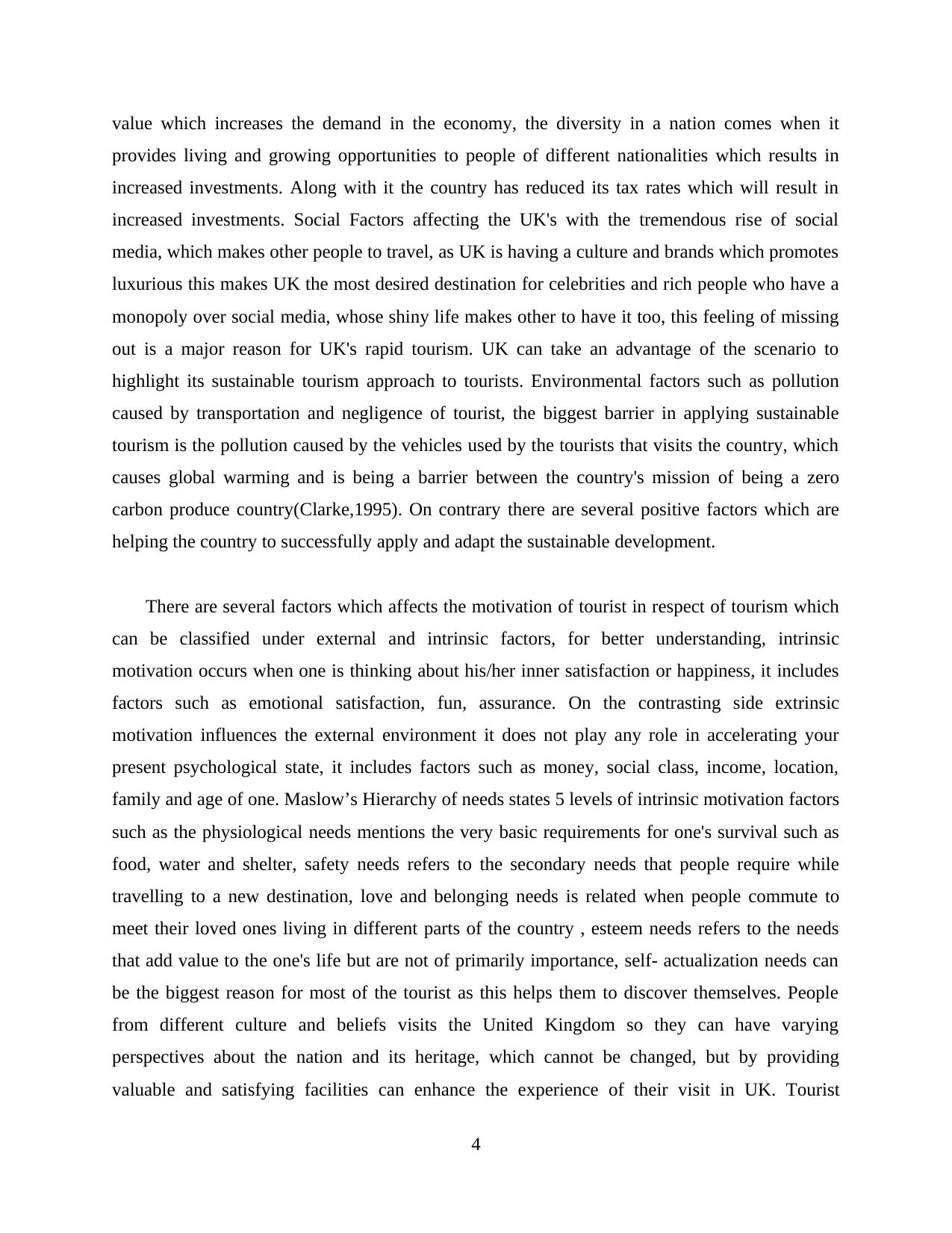
value which increases the demand in the economy, the diversity in a nation comes when it
provides living and growing opportunities to people of different nationalities which results in
increased investments. Along with it the country has reduced its tax rates which will result in
increased investments. Social Factors affecting the UK's with the tremendous rise of social
media, which makes other people to travel, as UK is having a culture and brands which promotes
luxurious this makes UK the most desired destination for celebrities and rich people who have a
monopoly over social media, whose shiny life makes other to have it too, this feeling of missing
out is a major reason for UK's rapid tourism. UK can take an advantage of the scenario to
highlight its sustainable tourism approach to tourists. Environmental factors such as pollution
caused by transportation and negligence of tourist, the biggest barrier in applying sustainable
tourism is the pollution caused by the vehicles used by the tourists that visits the country, which
causes global warming and is being a barrier between the country's mission of being a zero
carbon produce country(Clarke,1995). On contrary there are several positive factors which are
helping the country to successfully apply and adapt the sustainable development.
There are several factors which affects the motivation of tourist in respect of tourism which
can be classified under external and intrinsic factors, for better understanding, intrinsic
motivation occurs when one is thinking about his/her inner satisfaction or happiness, it includes
factors such as emotional satisfaction, fun, assurance. On the contrasting side extrinsic
motivation influences the external environment it does not play any role in accelerating your
present psychological state, it includes factors such as money, social class, income, location,
family and age of one. Maslow’s Hierarchy of needs states 5 levels of intrinsic motivation factors
such as the physiological needs mentions the very basic requirements for one's survival such as
food, water and shelter, safety needs refers to the secondary needs that people require while
travelling to a new destination, love and belonging needs is related when people commute to
meet their loved ones living in different parts of the country , esteem needs refers to the needs
that add value to the one's life but are not of primarily importance, self- actualization needs can
be the biggest reason for most of the tourist as this helps them to discover themselves. People
from different culture and beliefs visits the United Kingdom so they can have varying
perspectives about the nation and its heritage, which cannot be changed, but by providing
valuable and satisfying facilities can enhance the experience of their visit in UK. Tourist
4
provides living and growing opportunities to people of different nationalities which results in
increased investments. Along with it the country has reduced its tax rates which will result in
increased investments. Social Factors affecting the UK's with the tremendous rise of social
media, which makes other people to travel, as UK is having a culture and brands which promotes
luxurious this makes UK the most desired destination for celebrities and rich people who have a
monopoly over social media, whose shiny life makes other to have it too, this feeling of missing
out is a major reason for UK's rapid tourism. UK can take an advantage of the scenario to
highlight its sustainable tourism approach to tourists. Environmental factors such as pollution
caused by transportation and negligence of tourist, the biggest barrier in applying sustainable
tourism is the pollution caused by the vehicles used by the tourists that visits the country, which
causes global warming and is being a barrier between the country's mission of being a zero
carbon produce country(Clarke,1995). On contrary there are several positive factors which are
helping the country to successfully apply and adapt the sustainable development.
There are several factors which affects the motivation of tourist in respect of tourism which
can be classified under external and intrinsic factors, for better understanding, intrinsic
motivation occurs when one is thinking about his/her inner satisfaction or happiness, it includes
factors such as emotional satisfaction, fun, assurance. On the contrasting side extrinsic
motivation influences the external environment it does not play any role in accelerating your
present psychological state, it includes factors such as money, social class, income, location,
family and age of one. Maslow’s Hierarchy of needs states 5 levels of intrinsic motivation factors
such as the physiological needs mentions the very basic requirements for one's survival such as
food, water and shelter, safety needs refers to the secondary needs that people require while
travelling to a new destination, love and belonging needs is related when people commute to
meet their loved ones living in different parts of the country , esteem needs refers to the needs
that add value to the one's life but are not of primarily importance, self- actualization needs can
be the biggest reason for most of the tourist as this helps them to discover themselves. People
from different culture and beliefs visits the United Kingdom so they can have varying
perspectives about the nation and its heritage, which cannot be changed, but by providing
valuable and satisfying facilities can enhance the experience of their visit in UK. Tourist
4
⊘ This is a preview!⊘
Do you want full access?
Subscribe today to unlock all pages.

Trusted by 1+ million students worldwide
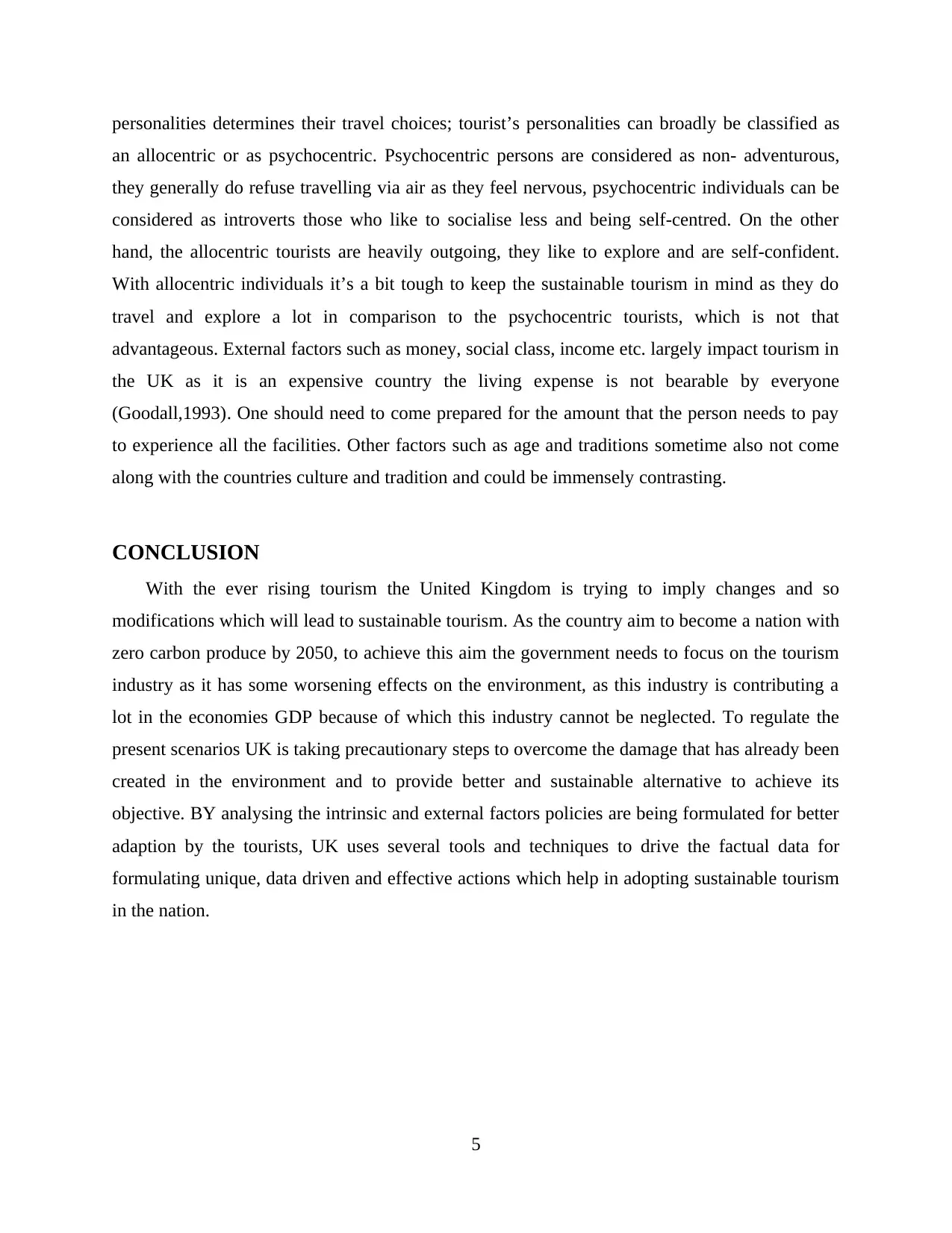
personalities determines their travel choices; tourist’s personalities can broadly be classified as
an allocentric or as psychocentric. Psychocentric persons are considered as non- adventurous,
they generally do refuse travelling via air as they feel nervous, psychocentric individuals can be
considered as introverts those who like to socialise less and being self-centred. On the other
hand, the allocentric tourists are heavily outgoing, they like to explore and are self-confident.
With allocentric individuals it’s a bit tough to keep the sustainable tourism in mind as they do
travel and explore a lot in comparison to the psychocentric tourists, which is not that
advantageous. External factors such as money, social class, income etc. largely impact tourism in
the UK as it is an expensive country the living expense is not bearable by everyone
(Goodall,1993). One should need to come prepared for the amount that the person needs to pay
to experience all the facilities. Other factors such as age and traditions sometime also not come
along with the countries culture and tradition and could be immensely contrasting.
CONCLUSION
With the ever rising tourism the United Kingdom is trying to imply changes and so
modifications which will lead to sustainable tourism. As the country aim to become a nation with
zero carbon produce by 2050, to achieve this aim the government needs to focus on the tourism
industry as it has some worsening effects on the environment, as this industry is contributing a
lot in the economies GDP because of which this industry cannot be neglected. To regulate the
present scenarios UK is taking precautionary steps to overcome the damage that has already been
created in the environment and to provide better and sustainable alternative to achieve its
objective. BY analysing the intrinsic and external factors policies are being formulated for better
adaption by the tourists, UK uses several tools and techniques to drive the factual data for
formulating unique, data driven and effective actions which help in adopting sustainable tourism
in the nation.
5
an allocentric or as psychocentric. Psychocentric persons are considered as non- adventurous,
they generally do refuse travelling via air as they feel nervous, psychocentric individuals can be
considered as introverts those who like to socialise less and being self-centred. On the other
hand, the allocentric tourists are heavily outgoing, they like to explore and are self-confident.
With allocentric individuals it’s a bit tough to keep the sustainable tourism in mind as they do
travel and explore a lot in comparison to the psychocentric tourists, which is not that
advantageous. External factors such as money, social class, income etc. largely impact tourism in
the UK as it is an expensive country the living expense is not bearable by everyone
(Goodall,1993). One should need to come prepared for the amount that the person needs to pay
to experience all the facilities. Other factors such as age and traditions sometime also not come
along with the countries culture and tradition and could be immensely contrasting.
CONCLUSION
With the ever rising tourism the United Kingdom is trying to imply changes and so
modifications which will lead to sustainable tourism. As the country aim to become a nation with
zero carbon produce by 2050, to achieve this aim the government needs to focus on the tourism
industry as it has some worsening effects on the environment, as this industry is contributing a
lot in the economies GDP because of which this industry cannot be neglected. To regulate the
present scenarios UK is taking precautionary steps to overcome the damage that has already been
created in the environment and to provide better and sustainable alternative to achieve its
objective. BY analysing the intrinsic and external factors policies are being formulated for better
adaption by the tourists, UK uses several tools and techniques to drive the factual data for
formulating unique, data driven and effective actions which help in adopting sustainable tourism
in the nation.
5
Paraphrase This Document
Need a fresh take? Get an instant paraphrase of this document with our AI Paraphraser
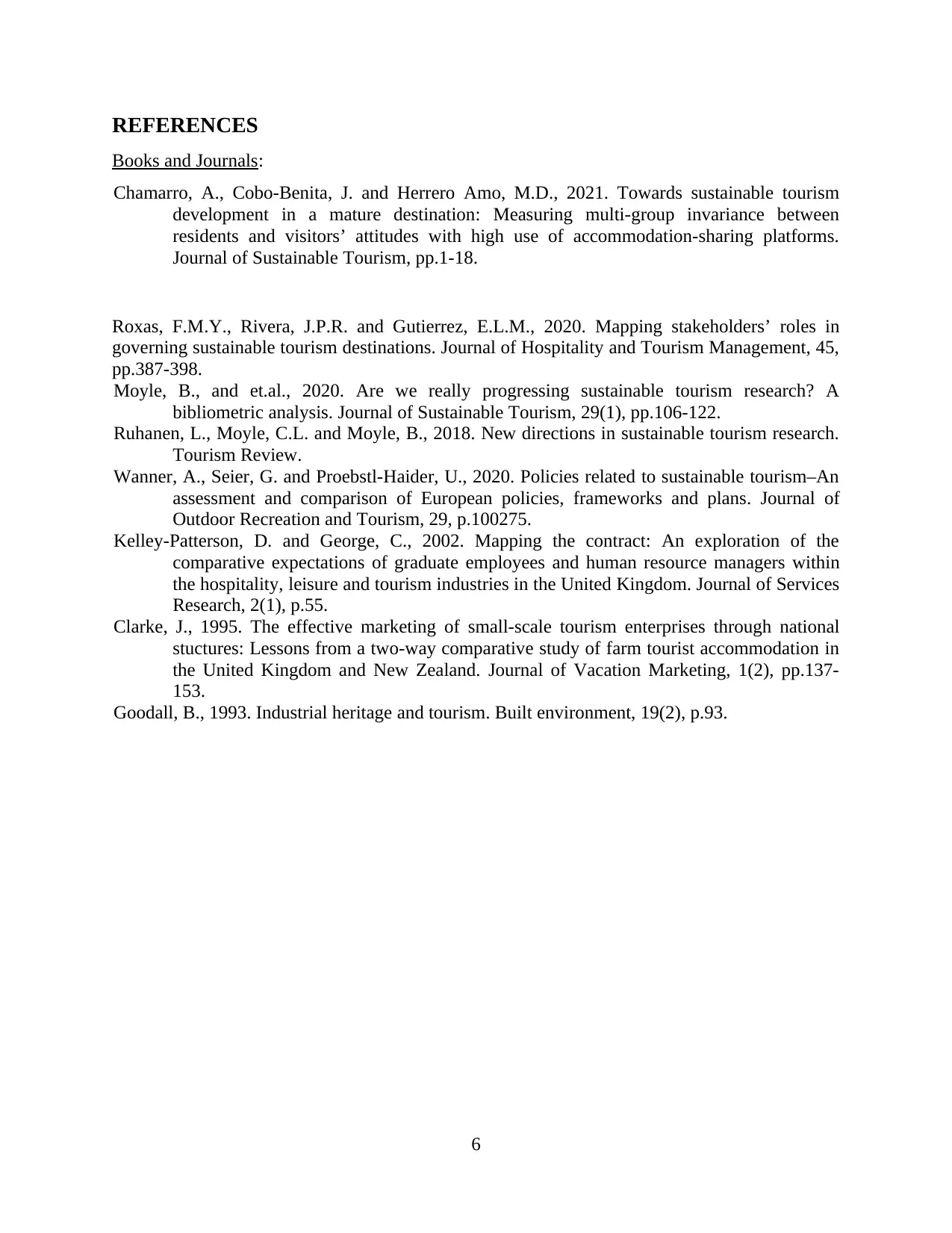
REFERENCES
Books and Journals:
Chamarro, A., Cobo-Benita, J. and Herrero Amo, M.D., 2021. Towards sustainable tourism
development in a mature destination: Measuring multi-group invariance between
residents and visitors’ attitudes with high use of accommodation-sharing platforms.
Journal of Sustainable Tourism, pp.1-18.
Roxas, F.M.Y., Rivera, J.P.R. and Gutierrez, E.L.M., 2020. Mapping stakeholders’ roles in
governing sustainable tourism destinations. Journal of Hospitality and Tourism Management, 45,
pp.387-398.
Moyle, B., and et.al., 2020. Are we really progressing sustainable tourism research? A
bibliometric analysis. Journal of Sustainable Tourism, 29(1), pp.106-122.
Ruhanen, L., Moyle, C.L. and Moyle, B., 2018. New directions in sustainable tourism research.
Tourism Review.
Wanner, A., Seier, G. and Proebstl-Haider, U., 2020. Policies related to sustainable tourism–An
assessment and comparison of European policies, frameworks and plans. Journal of
Outdoor Recreation and Tourism, 29, p.100275.
Kelley-Patterson, D. and George, C., 2002. Mapping the contract: An exploration of the
comparative expectations of graduate employees and human resource managers within
the hospitality, leisure and tourism industries in the United Kingdom. Journal of Services
Research, 2(1), p.55.
Clarke, J., 1995. The effective marketing of small-scale tourism enterprises through national
stuctures: Lessons from a two-way comparative study of farm tourist accommodation in
the United Kingdom and New Zealand. Journal of Vacation Marketing, 1(2), pp.137-
153.
Goodall, B., 1993. Industrial heritage and tourism. Built environment, 19(2), p.93.
6
Books and Journals:
Chamarro, A., Cobo-Benita, J. and Herrero Amo, M.D., 2021. Towards sustainable tourism
development in a mature destination: Measuring multi-group invariance between
residents and visitors’ attitudes with high use of accommodation-sharing platforms.
Journal of Sustainable Tourism, pp.1-18.
Roxas, F.M.Y., Rivera, J.P.R. and Gutierrez, E.L.M., 2020. Mapping stakeholders’ roles in
governing sustainable tourism destinations. Journal of Hospitality and Tourism Management, 45,
pp.387-398.
Moyle, B., and et.al., 2020. Are we really progressing sustainable tourism research? A
bibliometric analysis. Journal of Sustainable Tourism, 29(1), pp.106-122.
Ruhanen, L., Moyle, C.L. and Moyle, B., 2018. New directions in sustainable tourism research.
Tourism Review.
Wanner, A., Seier, G. and Proebstl-Haider, U., 2020. Policies related to sustainable tourism–An
assessment and comparison of European policies, frameworks and plans. Journal of
Outdoor Recreation and Tourism, 29, p.100275.
Kelley-Patterson, D. and George, C., 2002. Mapping the contract: An exploration of the
comparative expectations of graduate employees and human resource managers within
the hospitality, leisure and tourism industries in the United Kingdom. Journal of Services
Research, 2(1), p.55.
Clarke, J., 1995. The effective marketing of small-scale tourism enterprises through national
stuctures: Lessons from a two-way comparative study of farm tourist accommodation in
the United Kingdom and New Zealand. Journal of Vacation Marketing, 1(2), pp.137-
153.
Goodall, B., 1993. Industrial heritage and tourism. Built environment, 19(2), p.93.
6
1 out of 8
Related Documents
Your All-in-One AI-Powered Toolkit for Academic Success.
+13062052269
info@desklib.com
Available 24*7 on WhatsApp / Email
![[object Object]](/_next/static/media/star-bottom.7253800d.svg)
Unlock your academic potential
© 2024 | Zucol Services PVT LTD | All rights reserved.



